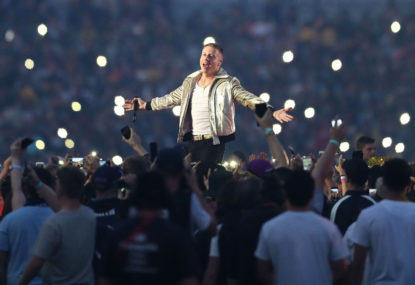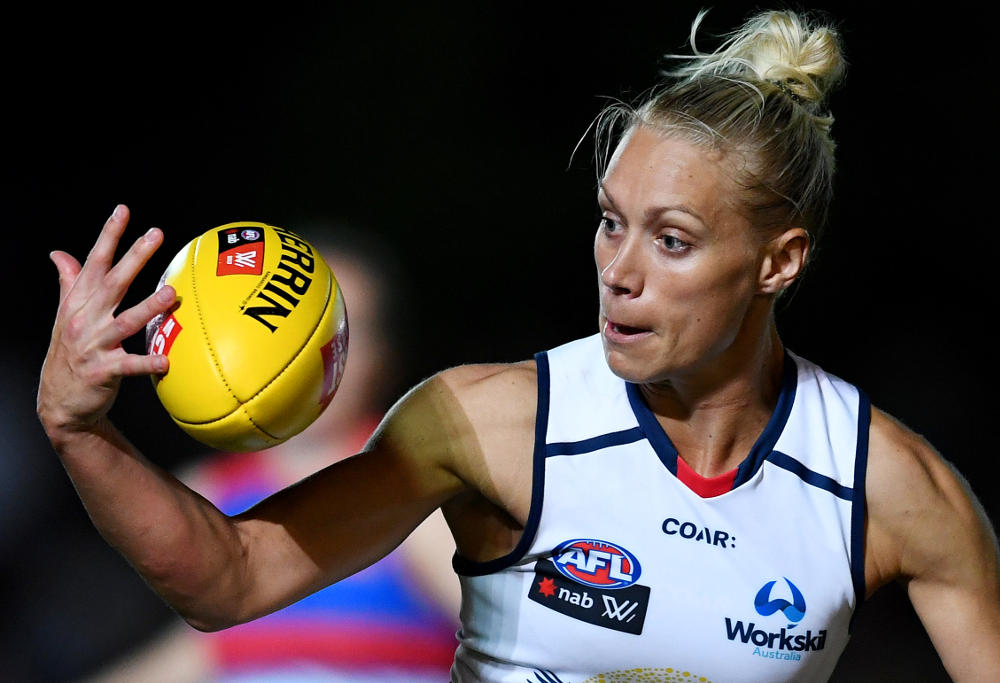Forget Cripps, Curnow and Walsh - the unsung Blues heroes driving Carlton's premiership push
The Blues have truly stood up and are a genuine flag threat in 2024 and they have their younger brigade of troops to thank for it.

It’s been a big few weeks for politics in sports.
AFL clubs have been racing to declare their allegiances in the upcoming same-sex marriage battle, while Macklemore has singlehandedly turned half of the voting population in Australia by performing his song ‘Same Love’ at Sunday’s NRL grand final.
And then there’s the controversy that has divided the United States, as NFL players kneel and link arms during the ‘Star Spangled Banner’ national anthem.
But why are we stunned and enraged when politics so plainly infiltrates our sports arenas?
In theory, sporting stadiums are supposed to be cathedrals of sporting consumption, where we can go for a few hours and be free from politicians, policies and the endless media commentary that accompanies these issues.
The sight of African-American players kneeling during the United States national anthem before the start of games has thrown a light on the prevalence of politics in sport. A lot of commentary around the issue is that such political stances shouldn’t be brought into sports and that these players have no right to do so.
However, the fact of the matter is: sport is politics. Whether you have noticed it or not, the sports that you have been watching have many political undertones.
The governing bodies of Australian sports in the past few weeks have come out either in support or against the current same-sex marriage proposal. It may be difficult to understand why an organisation such as the AFL needs to rebrand its headquarters “YES” to show its support.
But by doing so, the AFL has ensured that it didn’t undo years of tremendous work promoting and increasing diversity and equality within the AFL. Sometimes saying nothing is more damaging than being loud and brash.
The AFLW did a fantastic job at embracing the diversity of players, as shown by the celebration when the eventual winner of the inaugural AFLW MVP award, Erin Phillips, collected her medal with wife Tracy Gahan by her side.

(AAP Image/Tracey Nearmy)
Will this acceptance of “different” translate into the men’s competition? Will we someday see an AFL player bring a male partner along the red carpet and be asked only about whose suit he’s wearing?
For NFL players, the choice of the national anthem to stage a protest is a delicate one. The American anthem and flag are the two most powerful symbols of patriotism. These are symbols that Americans treasure dearly, as they represent the ideals that the “greatest nation on earth” is founded upon, such as hope, freedom, justice and equality.
The anthem is the vehicle for protest because these symbols of what America stands for are not being upheld. After remaining seated during the national anthem before a 2016 preseason game, Colin Kaepernick said, “I am not going to stand up and show pride in a flag for a country that oppresses black people” and that “this is bigger than football.”
Sportspeople, whether rightly or wrongly, are role models within society. They are leaders in their communities and are the idols that kids aspire to be.
So then, if an athlete experiences or knows of injustice, inequality and violations of human rights occurring within their society, is it right for a role model to cast these wrongs aside? Or do they use their position of influence and privilege to make the world a better place?
What type of role model do we want them to be? What do we want them to show our kids?
Sportspeople are leaders. In a world that Donald Trump says is filled with “fake news”, sportsmen and women have the power to make people tune in and listen.
To kneel during the national anthem will make white America stop and pay attention. To say this protest is about disrespecting the anthem is to miss the point entirely.
If something was being done to stop the police shootings of unarmed African-Americans, players wouldn’t be kneeling during the national anthem.
If proper public enquiries were made and accused police officers were held accountable in a court of law, LeBron James wouldn’t need to make public statements such as when he wore an “I Can’t Breathe” t-shirt in memory of Eric Garner in 2014.
The players, coaches and officials that have knelt and linked arms during the national anthem are heroes, but not in a sporting sense. These acts are more heroic than anything that they have done on the field.
We may not realise or appreciate it now, but people didn’t recognise the courage and defiance of Americans Tommie Smith and John Carlos’ black power salute at the 1968 Olympic Games at the time either. But eventually, we did.
Sport has the unique ability to divide people into teams, while also bringing them together. Most importantly, sport has the power to create change.